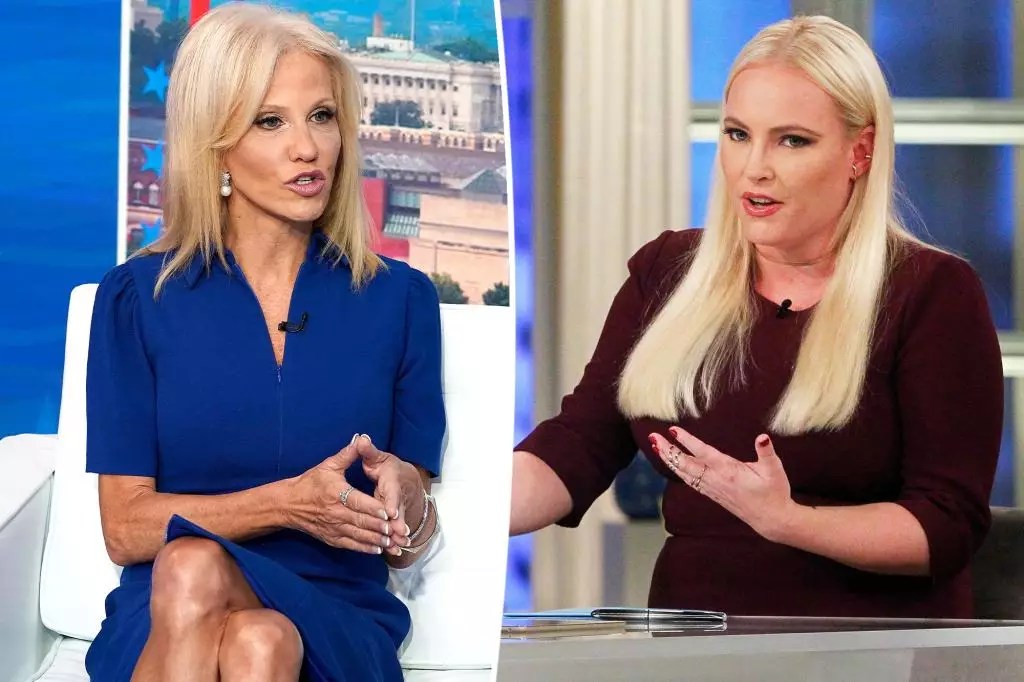In an age where political discourse often spills over into personal realms, the recent confrontation between Kellyanne Conway and Meghan McCain serves as a striking illustration of this phenomenon. The environment which initially seems to offer a platform for dialogue often morphs into a battleground, where emotions run high and the stakes feel personal. This incident not only highlights individual personalities and their interactions but also sheds light on broader cultural implications regarding political representation and personal boundaries.
The altercation unfolded backstage at a Women’s Summit panel, which included prominent figures such as Conway, McCain, and Minyon Moore. A discussion meant to empower often transforms into a scene of discord when differing perspectives clash. For all their public personas, celebrity figures are still human, subject to vulnerabilities and emotional responses. Eyewitness accounts reveal a fracture in the interactions, with some claiming Conway approached McCain to express her distress over remarks made about her marriage. The public setting, usually seen as a neutral ground, became an incubator for discord where personal grievances took center stage.
The differing narratives present a classic he-said-she-said scenario, an adversarial space where the interpretation of “professionalism” and “disrespect” sharply diverges. McCain’s irritation over Conway’s marriage to George Conway—a figure often seen as critical of former President Trump—reflects a deep-seated connection between personal relationships and public perception in today’s political theater. The exchange dissects the influence of public commentary on personal lives while reinforcing the idea that commentary about relationships can quickly escalate into accusations.
Moreover, this incident illustrates how individuals in public domains are continually scrutinized, and the emotional toll it can take. McCain’s response, reportedly characterized by apparent discomfort during the confrontation, suggests that the consequences of political discourse extend beyond debate panels into the realm of mental and emotional health. The pressure of constant public evaluation can lead to desperate pleas for personal space, as seen in McCain’s repetitive, “You’re in my space. I’m uncomfortable.” The juxtaposition of a plea for personal space against Conway’s pointed retorts conjures an unsettling atmosphere where personal boundaries are not just tested but openly violated.
When examining the dynamics of their exchanges, one might wonder about the motivations driving Conway’s public defense of her marriage and personal standing. The instance was allegedly triggered by earlier comments made by McCain on national platforms, placing both women in a position where longstanding animosities fueled their verbal sparring. The stakes of celebrity culture are elevated in political discussions, wherein personal and familial histories become fodder for public discourse—often with little regard for the potential fallout. The psychological burdens of being in the limelight could prompt defensiveness, leading to confrontations that crystalize larger societal issues.
Intervention and the Role of the Audience
The climax of the incident invites discussions regarding the role of bystanders or interveners in public confrontations within political circles. This scenario not only illustrates the failure of personal resolution but also highlights the eye of public scrutiny, wherein debates become performance art, called out for being either rehearsed or genuine. The notion that someone intervened, as some accounts suggest, indicates an urgent need to restore decorum in increasingly contentious discussions.
The claims by Conway stating she remained composed while addressing McCain provide an alarming contrast to the chaotic atmosphere described by eyewitnesses. Thereby raising the question: how do public figures navigate personal disagreements when all eyes are on them? The self-policing of behavior in public forums must balance an authentic representation of feelings against the need for professionalism—an ongoing struggle in celebrity culture.
The Conway-McCain incident reveals much about the intersection of personal relationships and political arenas. The clash can be seen not merely as a personal dispute but as a representation of broader societal tensions. As political figures continue to grapple with their identities and the politics of their personal lives, the pathways to respectful discourse grow increasingly convoluted. The incident serves as a reminder that all public discussions are tinged with personal stakes, and without careful navigation, they may devolve into chaos, reflecting the complex weave of humanity within the political sphere.







Leave a Reply